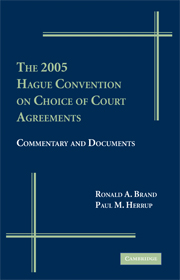Book contents
- Frontmatter
- Contents
- Preface
- PART I A BASIC INTRODUCTION TO THE 2005 HAGUE CHOICE OF COURT CONVENTION
- PART II ARTICLE-BY-ARTICLE COMMENTARY ON THE CONVENTION
- PART III CHOICE OF COURT IN THE ABSENCE OF A MULTILATERAL CONVENTION
- PART IV LITIGATION AND ARBITRATION CHOICES AFTER THE HAGUE CONVENTION
- 11 Planning the Choice of Forum: Choice of Court under the Hague Convention and Arbitration under the New York Convention
- Appendix A Explanatory Report by Trevor Hartley & Masato Dogauchi (including the text of the 2005 Hague Convention on Choice of Court Agreements)
- Appendix B Cited Excerpts from the Nygh-Pocar Report
- Index
11 - Planning the Choice of Forum: Choice of Court under the Hague Convention and Arbitration under the New York Convention
from PART IV - LITIGATION AND ARBITRATION CHOICES AFTER THE HAGUE CONVENTION
Published online by Cambridge University Press: 26 October 2009
- Frontmatter
- Contents
- Preface
- PART I A BASIC INTRODUCTION TO THE 2005 HAGUE CHOICE OF COURT CONVENTION
- PART II ARTICLE-BY-ARTICLE COMMENTARY ON THE CONVENTION
- PART III CHOICE OF COURT IN THE ABSENCE OF A MULTILATERAL CONVENTION
- PART IV LITIGATION AND ARBITRATION CHOICES AFTER THE HAGUE CONVENTION
- 11 Planning the Choice of Forum: Choice of Court under the Hague Convention and Arbitration under the New York Convention
- Appendix A Explanatory Report by Trevor Hartley & Masato Dogauchi (including the text of the 2005 Hague Convention on Choice of Court Agreements)
- Appendix B Cited Excerpts from the Nygh-Pocar Report
- Index
Summary
Why has arbitration become established worldwide as the usual method of resolving international commercial disputes?
There are two principal reasons. First, arbitration gives the parties an opportunity to choose a “neutral” forum and a “neutral” tribunal. Secondly, arbitration – if carried through to the end – leads to a decision which is enforceable against the losing party not only in the place where it is made but also internationally, under the provisions of such treaties as the New York Convention.
Rightly or wrongly, there is a fear among many business managers that arbitrators tend to be undisciplined wild cards, rendering “split the difference” awards that lack principle, and do for commercial controversies what Solomon threatened to do in the proverbial child custody dispute. Judges are seen as more predictable, and more likely to follow precedent.
INTRODUCTION
The debate over whether the best method of dispute resolution in international transactions is arbitration or litigation has occupied the time of many commentators, and has resulted in no clear conclusions. Like many such problems, what you see depends on where you stand, and each method has its advantages and disadvantages. Which is better will depend on the party and the transaction in question, and few would still assert that arbitration is “a universal panacea” in international commercial relationships. What is not debatable, however, is that, without the 2005 Hague Convention on Choice of Court Agreements, arbitration carries with it the undeniable advantages of the 1958 United Nations Convention on the Recognition and Enforcement of Foreign Arbitral Awards (the New York Convention), which provides a set of rules allowing for enforcement of arbitration agreements and the resulting arbitral awards in all of its 142 Contracting States.
- Type
- Chapter
- Information
- The 2005 Hague Convention on Choice of Court AgreementsCommentary and Documents, pp. 215 - 222Publisher: Cambridge University PressPrint publication year: 2008



